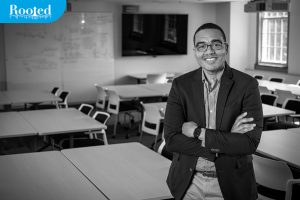Rooted: Brian Boyd
Brian Boyd has been contributing to research at Carolina for 13 years.

Brian Boyd has worked at UNC-Chapel Hill for 13 years in a variety of roles, most recently as the William C. Friday Distinguished Professor in the School of Education and interim director of the Frank Porter Graham (FPG) Child Development Institute.
What brought you to Carolina?
I came to Carolina in 2005 for a postdoctoral research fellowship in what was then called the Department of Allied Health Sciences in the School of Medicine. That department has since been renamed the Department of Health Sciences.
I was interested in pursuing a research career in autism and, as a postdoc, I worked with a wonderful mentor, Grace Baranek — a developmental psychologist and occupational therapist by training — who conducted research on the sensory experiences of young children on the autism spectrum.
How has your role here changed over the years?
It’s a bit overwhelming for me to reflect on my time at Carolina and the various roles I have had the privilege to occupy. After my fellowship, I transitioned into a position as an early career scientist at the FPG Child Development Institute. I worked there for almost two years before moving into a more traditional tenure-track faculty position in the Department of Health Sciences.
As I made that transition, I was awarded funding by the Institute of Education Sciences (IES) for two research projects on which I served as co-principal investigator. One project examined the comparative efficacy of two well-known and widely utilized classroom-based interventions for preschool-aged children with autism — structured teaching, which was pioneered by the TEACCH Autism Program at UNC-Chapel Hill, and the LEAP model, which was developed by Phil Strain who is now at the University of Denver. The second project developed a classroom-based intervention to support the communication and play of preschool-aged children with autism, and this became the Advancing Social-communication And Play intervention.
During that time, I advanced from an assistant professor to a tenured associate professor, and in 2017, I also took on the role of associate chair for research in the Department of Health Sciences — a position my former postdoctoral mentor held before me.
As part of advancing in my career, I began to move into the lead PI role on grants and secured funding from both NIH and IES to pursue my research. I also became more focused on measure development work, which may sound a bit tedious, but is necessary in my field. Researchers struggle with measurement in the study of autism because many commonly used measures were not specifically developed and validated for autistic people, so it affects our ability to measure meaningful change and progress in this population.
I am now a full professor in the School of Education, and in January 2023, I became interim director of FPG. It just goes to show you that Carolina provides lots of wonderful opportunities for career advancement.
What’s kept you at Carolina?
Well, I did leave Carolina for about five years to direct the Juniper Gardens Children’s Project at the University of Kansas (KU), and being there affected the trajectory of my research career.
I was fortunate to lead a research center that prioritized community-engaged research. So, I began to think more about the type of community-partnered research that I wanted to do and that led to work focused on children with and without disabilities from marginalized and racially minoritized backgrounds. I utilized my Carolina connections and collaborated with former colleagues Iheoma Iruka and Keith Payne on a study aimed at understanding the impact of implicit bias on children’s educational outcomes.
While I was at KU, I remained loyal to my Tar Heels and eventually returned to UNC-Chapel Hill to be on faculty in the School of Education — a natural academic home for me considering my background in special education.
There’s a wonderful autism research infrastructure at UNC-Chapel Hill that is almost unparalleled in the number of projects and researchers involved in the study of autism. The backbone of that infrastructure is the UNC Autism Research Center, which helps to coordinate and support research efforts. Prior to my move to KU, I was part of the executive committee for the center. As an autism researcher, it’s a great place to pursue the kind of research that I do.
Finally, my family is close by, which means in many ways Carolina feels like home.
What contribution are you most proud of?
I’m most proud of the work I’ve engaged in with colleagues at Carolina and other institutions to understand the impact of school-based interventions and programs on the outcomes of young children with autism. I was part of a research team that conducted one of the first comparative studies in the field on classroom-based interventions for preschool-aged children on the autism spectrum.
What is a uniquely Carolina experience you’ve had?
Interestingly, I worked at Carolina fresh out my undergraduate program at the TEACCH Autism Program, a statewide program based at UNC-Chapel Hill that serves autistic individuals and their families across the lifespan.
I served in a variety of roles that allowed me to understand the diversity of autism. I worked with autistic people with varying abilities and support needs across a range of ages by working in supported employment programs with autistic adults in their job settings, at an adult residential care facility, and as an assistant preschool teacher. Working at that uniquely Carolina program launched my autism research career.
From UNC Research (June 6, 2023) |